An Encounter With the Chief Director of an NGO That Continues to Take On Challenges in Developing Countries Leading Her to Rethink Her Career
Re-Discovered the Excitement of Taking the First Step Forward Through a Pro Bono Project
An Encounter With the Chief Director of an NGO That Continues to Take On Challenges in Developing Countries Leading Her to Rethink Her Career
Re-Discovered the Excitement of Taking the First Step Forward Through a Pro Bono Project
Ms. Saori Kitahara, an employee who participated in the Pro Bono project.
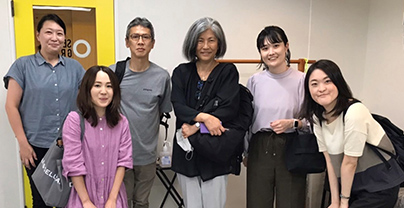
Ms. Kitahara is a mother of two children and works hard every day to raise them while working. After losing her father to gastric cancer, she became interested in a project that supports the organization called “Eradicate Gastric Cancer,” which operates primarily in developing countries. An encounter with a female doctor at the organization supported by the project profoundly impacted Ms. Kitahara’s way of life and work. We spoke with her about the changes in her thinking and realization that came about as a result of her participation in a Pro Bono project.
Ms. Kitahara is a mother of two children and works hard every day to raise them while working. After losing her father to gastric cancer, she became interested in a project that supports the organization called “Eradicate Gastric Cancer,” which operates primarily in developing countries. An encounter with a female doctor at the organization supported by the project profoundly impacted Ms. Kitahara’s way of life and work. We spoke with her about the changes in her thinking and realization that came about as a result of her participation in a Pro Bono project.
What Drove Me Was My Awareness and Challenging Spirit as a “Family Member of a Cancer Patient”
What Drove Me Was My Awareness and Challenging Spirit as a “Family Member of a Cancer Patient”
I lost my father to gastric cancer. When my father was diagnosed with gastric cancer, I read blogs by people who had gone through the disease to learn more about it. The information that only someone who had experienced the disease could provide was very helpful. What I desperately needed to know were things such as what kind of treatment my father would receive and how much it would cost his body, which was described in detail. I felt a sense of relief. Because of this experience, I wondered if there was anything I could do as a “family member of a cancer patient” to help. It was about 10 years before I learned about the Pro Bono project.
I lost my father to gastric cancer. When my father was diagnosed with gastric cancer, I read blogs by people who had gone through the disease to learn more about it. The information that only someone who had experienced the disease could provide was very helpful. What I desperately needed to know were things such as what kind of treatment my father would receive and how much it would cost his body, which was described in detail. I felt a sense of relief. Because of this experience, I wondered if there was anything I could do as a “family member of a cancer patient” to help. It was about 10 years before I learned about the Pro Bono project.
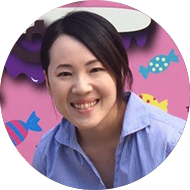
Ms. Saori Kitahara
Ms. Saori Kitahara
For a while, I was busy with work and raising my children and was unable to take action. Then one day, I came across an advertisement seeking Pro Bono project members to support an organization called “Eradicate Gastric Cancer.” The organization aimed to eradicate gastric cancer by providing technical assistance to medical professionals and conducting educational activities related to gastric cancer, mainly in developing countries in Asia where the gastric cancer rate is high. At the time, a year had passed since my return from childcare leave, and I was getting back into the rhythm of my life, so I took the plunge and attended an information session on the Pro Bono project. I originally thought that the bar for participating in the Pro Bono project was high and that only people with specialized skills were required. However, as I started hearing specific stories from employees who had experience with Pro Bono projects, such as what tools they used and how they implemented the project. I gradually began to get a picture of what Pro Bono projects are all about, and the hurdle I had thought was too high became slightly lower.
I think another factor that encouraged me to participate was my original interest in overseas volunteer work. I had experienced a short-term overseas homestay and a two-month backpacking trip, so I was not afraid to speak English. Above all, I liked challenging myself to do something worthwhile. I was busy with work and raising my children, and it was difficult for me to take on new challenges. However, when I came across the Pro Bono project, I thought, “This is the kind of work I liked!” and decided to participate. I was concerned about balancing it with my work and child-rearing, but my excitement won out.
For a while, I was busy with work and raising my children and was unable to take action. Then one day, I came across an advertisement seeking Pro Bono project members to support an organization called “Eradicate Gastric Cancer.” The organization aimed to eradicate gastric cancer by providing technical assistance to medical professionals and conducting educational activities related to gastric cancer, mainly in developing countries in Asia where the gastric cancer rate is high. At the time, a year had passed since my return from childcare leave, and I was getting back into the rhythm of my life, so I took the plunge and attended an information session on the Pro Bono project. I originally thought that the bar for participating in the Pro Bono project was high and that only people with specialized skills were required. However, as I started hearing specific stories from employees who had experience with Pro Bono projects, such as what tools they used and how they implemented the project. I gradually began to get a picture of what Pro Bono projects are all about, and the hurdle I had thought was too high became slightly lower.
I think another factor that encouraged me to participate was my original interest in overseas volunteer work. I had experienced a short-term overseas homestay and a two-month backpacking trip, so I was not afraid to speak English. Above all, I liked challenging myself to do something worthwhile. I was busy with work and raising my children, and it was difficult for me to take on new challenges. However, when I came across the Pro Bono project, I thought, “This is the kind of work I liked!” and decided to participate. I was concerned about balancing it with my work and child-rearing, but my excitement won out.
The Enthusiasm of the Chief Director of the NGO Made Me Think About My Way of Life
The Enthusiasm of the Chief Director of the NGO Made Me Think About My Way of Life
The encounters I have had through the Pro Bono project have been a great asset to me. In particular, meeting Ms. Kamogawa, the Chief Director and doctor, greatly impacted my life. Dr. Kamogawa is a very enthusiastic person who is constantly thinking about how she can achieve her goals and never stops challenging herself. For example, when Dr. Kamogawa wanted to work as a doctor in Austria, where her husband is from, her original medical license only allowed her to work in Japan, so she took the medical license exam in Austria in German and passed.
The encounters I have had through the Pro Bono project have been a great asset to me. In particular, meeting Ms. Kamogawa, the Chief Director and doctor, greatly impacted my life. Dr. Kamogawa is a very enthusiastic person who is constantly thinking about how she can achieve her goals and never stops challenging herself. For example, when Dr. Kamogawa wanted to work as a doctor in Austria, where her husband is from, her original medical license only allowed her to work in Japan, so she took the medical license exam in Austria in German and passed.
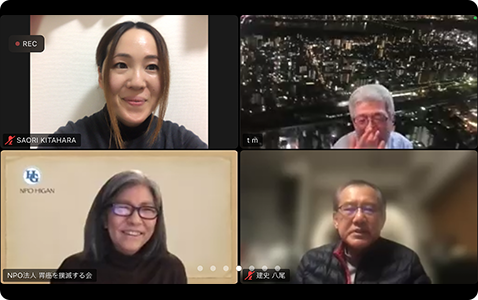
Interviews conducted overcoming location and time difference constraints
Interviews conducted overcoming location and time difference constraints
Such an encounter with Dr. Kamogawa led me to rethink my own career and way of life. Seeing Dr. Kamogawa, who should be very busy solely with her work as a doctor, take on new challenges reminded me that I, too, should not be content with the status quo. I am currently attending career expansion seminars in order to broaden my career options and horizons. Although the days of child-rearing were never free, I noticed myself becoming more conservative in my way of life. I frequently set barriers for myself, believing that balancing raising my children and taking on new challenges would be difficult. I quite often avoid new challenges. When I want to achieve something, instead of giving up because of barriers, I now keep asking myself the same question as Dr. Kamogawa did: “How can I make it happen?”
Such an encounter with Dr. Kamogawa led me to rethink my own career and way of life. Seeing Dr. Kamogawa, who should be very busy solely with her work as a doctor, take on new challenges reminded me that I, too, should not be content with the status quo. I am currently attending career expansion seminars in order to broaden my career options and horizons. Although the days of child-rearing were never free, I noticed myself becoming more conservative in my way of life. I frequently set barriers for myself, believing that balancing raising my children and taking on new challenges would be difficult. I quite often avoid new challenges. When I want to achieve something, instead of giving up because of barriers, I now keep asking myself the same question as Dr. Kamogawa did: “How can I make it happen?”
Being Timid Is Such a Waste. There Are Things That Second- Or Tenth-Year Employees Can Do
Being Timid Is Such a Waste. There Are Things That Second- Or Tenth-Year Employees Can Do
I believe that one of the most rewarding aspects of Pro Bono projects is the opportunity to experience and try things that can only be done on a volunteer basis. As part of my Pro Bono project activities, I interviewed the president of a medical university in Bhutan in English for about two and a half hours. Although I am fluent in English, it had been a while since I had spoken it, and his distinct Asian accent was difficult to understand. In the end, most of the interview was conducted by another project member who usually works in English, so I felt a bit depressed that I could not be of any help. However, a project member encouraged me, saying, “You are participating in this project because you want to support the organization.
I believe that one of the most rewarding aspects of Pro Bono projects is the opportunity to experience and try things that can only be done on a volunteer basis. As part of my Pro Bono project activities, I interviewed the president of a medical university in Bhutan in English for about two and a half hours. Although I am fluent in English, it had been a while since I had spoken it, and his distinct Asian accent was difficult to understand. In the end, most of the interview was conducted by another project member who usually works in English, so I felt a bit depressed that I could not be of any help. However, a project member encouraged me, saying, “You are participating in this project because you want to support the organization.
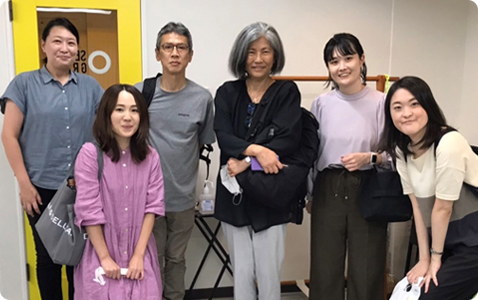
Dr. Kamogawa, the Chief Director, and the Pro Bono project members
Dr. Kamogawa, the Chief Director, and the Pro Bono project members
It would be a waste to be too concerned about the outcome and be intimidated.” Of course, I must strive to meet the expectations of the organization we support, but I felt that it would be a waste not to challenge myself because of my inexperience.
In addition, there were many situations in which unexpected skills and perspectives could be utilized in a Pro Bono project. For example, the organization often asked me to provide “the view of an ordinary citizen.” I was once asked to provide feedback on how to improve the organization’s website and grant application. The organization’s staff was concerned about whether the descriptions were understandable to the general public, as they are frequently exposed to unique wording, including medical terminology. I was surprised that my opinion, just a corporate employee, could be so valued.
From this perspective, I believe that Pro Bono projects are something where employees of all ages can participate. One of our project members was in his second year with Panasonic, and he was the best in terms of digital technology knowledge and perspective. All project members, who possessed a wide range of skills, including accounting and information technology, collaborated to not only design the organization’s workflow as originally requested but also to improve the organization’s website and obtain funds for its operations. I believe that the interesting thing about Pro Bono projects is that there is no need to feel self-conscious about being young or inexperienced, and each person can use their own perspective and knowledge they can offer at that time. It is better to participate in a Pro Bono project than later regretting haven’t. If you are considering it, please give it a try.
It would be a waste to be too concerned about the outcome and be intimidated.” Of course, I must strive to meet the expectations of the organization we support, but I felt that it would be a waste not to challenge myself because of my inexperience.
In addition, there were many situations in which unexpected skills and perspectives could be utilized in a Pro Bono project. For example, the organization often asked me to provide “the view of an ordinary citizen.” I was once asked to provide feedback on how to improve the organization’s website and grant application. The organization’s staff was concerned about whether the descriptions were understandable to the general public, as they are frequently exposed to unique wording, including medical terminology. I was surprised that my opinion, just a corporate employee, could be so valued.
From this perspective, I believe that Pro Bono projects are something where employees of all ages can participate. One of our project members was in his second year with Panasonic, and he was the best in terms of digital technology knowledge and perspective. All project members, who possessed a wide range of skills, including accounting and information technology, collaborated to not only design the organization’s workflow as originally requested but also to improve the organization’s website and obtain funds for its operations. I believe that the interesting thing about Pro Bono projects is that there is no need to feel self-conscious about being young or inexperienced, and each person can use their own perspective and knowledge they can offer at that time. It is better to participate in a Pro Bono project than later regretting haven’t. If you are considering it, please give it a try.
Guided by her experience of losing her father to gastric cancer and her interest in volunteering abroad, Ms. Kitahara decided to take up working on a Pro Bono project. What awaited Ms. Kitahara was an encounter with people who gave her the opportunity to rethink her life. Members of a Pro Bono project come from a diverse range of fields and professions, which is one of the project’s most appealing features. Whether you are a parent like Ms. Kitahara or from a younger generation just starting out in the workforce, there are plenty of discoveries and interesting things to be involved in.
Guided by her experience of losing her father to gastric cancer and her interest in volunteering abroad, Ms. Kitahara decided to take up working on a Pro Bono project. What awaited Ms. Kitahara was an encounter with people who gave her the opportunity to rethink her life. Members of a Pro Bono project come from a diverse range of fields and professions, which is one of the project’s most appealing features. Whether you are a parent like Ms. Kitahara or from a younger generation just starting out in the workforce, there are plenty of discoveries and interesting things to be involved in.
Pro Bono project in which Ms. Kitahara participated:
Pro Bono project in which Ms. Kitahara participated:
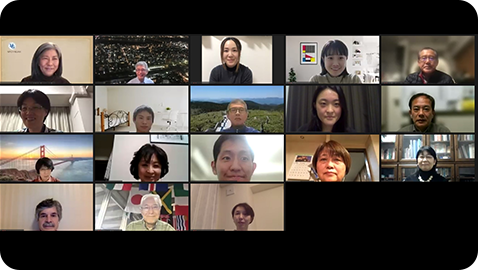
Seven Panasonic Group employees worked on the “workflow design” of the non-profit organization “Eradicate Gastric Cancer (abbreviated as ‘HIGAN’),” which is led by doctors, researchers, and academics and aims to eradicate gastric cancer, to improve the organization’s operational infrastructure.
Seven Panasonic Group employees worked on the “workflow design” of the non-profit organization “Eradicate Gastric Cancer (abbreviated as ‘HIGAN’),” which is led by doctors, researchers, and academics and aims to eradicate gastric cancer, to improve the organization’s operational infrastructure.


